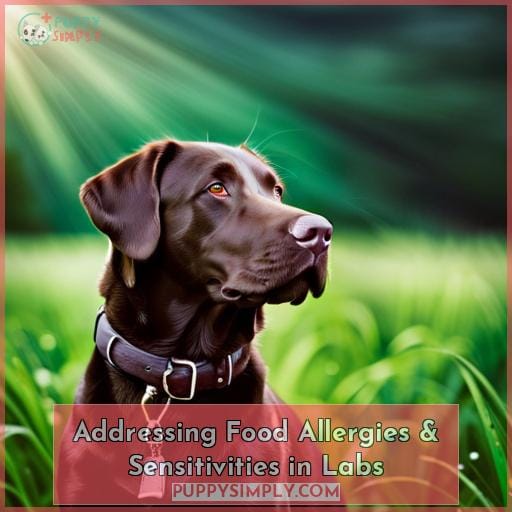
The Ultimate Guide to Dog Food for Labrador Retrievers with Allergies
Labrador Retrievers are beloved for their friendly demeanor, intelligence, and boundless energy. However, like many breeds, they can be prone to allergies, which can manifest in a variety of uncomfortable symptoms. One of the most crucial ways to manage allergies in Labs is through their diet. Choosing the right dog food can make a significant difference in their overall health and well-being.
Understanding Allergies in Labrador Retrievers
Before diving into the specifics of dog food, it’s essential to understand what allergies are and how they affect Labrador Retrievers. Allergies are immune system responses to substances (allergens) that are typically harmless. When a Lab with allergies encounters an allergen, their immune system overreacts, leading to various symptoms.
Common Allergens for Labs:
- Food Allergens: These are often proteins like beef, chicken, dairy, eggs, soy, and wheat.
- Environmental Allergens: Pollen, dust mites, mold, and grasses can trigger allergic reactions.
- Flea Allergy Dermatitis: An allergic reaction to flea saliva.
Signs of Allergies in Labs:
- Skin Issues: Itchy skin (pruritus), excessive scratching, licking, biting, hot spots, skin rashes, hives, and hair loss.
- Ear Infections: Frequent ear infections, often accompanied by redness, discharge, and head shaking.
- Gastrointestinal Problems: Vomiting, diarrhea, gas, and loss of appetite.
- Respiratory Issues: Coughing, sneezing, and wheezing (less common but possible).
The Role of Diet in Managing Allergies
Diet plays a critical role in managing allergies in Labrador Retrievers, particularly food allergies. By identifying and eliminating offending ingredients, you can significantly reduce or eliminate allergic symptoms.
Key Considerations When Choosing Dog Food for Labs with Allergies:
-
Limited Ingredient Diets (LID):
- LID formulas contain a limited number of ingredients, reducing the chances of triggering an allergic reaction.
- These diets typically feature a single source of protein and a single source of carbohydrate.
- Common protein sources in LID formulas include:
- Novel Proteins: These are proteins that your Lab has likely not been exposed to before, such as duck, venison, salmon, lamb, or rabbit.
- Hydrolyzed Proteins: Proteins that have been broken down into smaller pieces, making them less likely to trigger an allergic response.
- Common carbohydrate sources in LID formulas include:
- Sweet potatoes
- Peas
- Tapioca
- Oats
-
Grain-Free vs. Grain-Inclusive:
- Grain-Free: These diets exclude common grains like wheat, corn, and soy, which can be potential allergens for some Labs. However, it’s important to note that grain-free diets have been linked to a potential risk of dilated cardiomyopathy (DCM) in some dogs. It’s best to consult with your vet before switching to a grain-free diet.
- Grain-Inclusive: These diets include grains like brown rice, barley, or oats. These grains are generally well-tolerated by most dogs and can provide essential nutrients.
-
Hypoallergenic Dog Food:
- Hypoallergenic dog foods are specifically formulated to minimize the risk of allergic reactions.
- They often contain hydrolyzed proteins and limited ingredients.
- These diets are often recommended by veterinarians for dogs with severe allergies.
-
Ingredients to Avoid:
- Common Allergens: Beef, chicken, dairy, eggs, wheat, corn, and soy.
- Artificial Additives: Artificial colors, flavors, and preservatives can sometimes trigger allergic reactions.
- Fillers: Inexpensive fillers like corn gluten meal or soybean hulls offer little nutritional value and can sometimes cause digestive upset.
-
Omega-3 Fatty Acids:
- Omega-3 fatty acids, particularly EPA and DHA, have anti-inflammatory properties that can help soothe itchy skin and reduce inflammation associated with allergies.
- Good sources of omega-3 fatty acids include fish oil, flaxseed oil, and algae oil.
-
Probiotics and Prebiotics:
- Probiotics are beneficial bacteria that support a healthy gut microbiome.
- Prebiotics are non-digestible fibers that feed probiotics.
- A healthy gut microbiome can help strengthen the immune system and reduce the risk of allergic reactions.
-
Consult with Your Veterinarian:
- Before making any significant changes to your Lab’s diet, it’s essential to consult with your veterinarian.
- Your vet can help you identify potential allergens and recommend the best diet for your dog’s specific needs.
- They may also recommend allergy testing to pinpoint specific allergens.
Transitioning to a New Diet:
When switching your Lab to a new diet, it’s important to do so gradually to avoid digestive upset. Mix a small amount of the new food with the old food, gradually increasing the amount of new food over a period of 7-10 days.
Homemade Dog Food:
Some owners choose to prepare homemade dog food for their Labs with allergies. This allows for complete control over the ingredients, but it’s essential to work with a veterinary nutritionist to ensure that the diet is nutritionally balanced.
Top Dog Food Brands for Labs with Allergies:
- Purina Pro Plan Veterinary Diets HA Hydrolyzed: Features hydrolyzed protein and is often recommended by vets for food allergies.
- Royal Canin Veterinary Diet Hydrolyzed Protein HP: Another excellent option with hydrolyzed protein for allergy management.
- Hill’s Prescription Diet z/d Food Sensitivities: Designed for dogs with food sensitivities and allergies.
- Blue Buffalo Basics Limited Ingredient Diet: Offers a variety of LID formulas with different protein sources.
- Natural Balance Limited Ingredient Diets: Another popular brand with a range of LID options.
- Wellness Simple Limited Ingredient Diet: Focuses on simple, wholesome ingredients.
Important Considerations:
- Read Labels Carefully: Always read the ingredient list carefully to ensure that the food does not contain any potential allergens.
- Monitor Your Dog’s Response: Pay close attention to your Lab’s symptoms after switching to a new diet. If their symptoms worsen, consult with your veterinarian.
- Be Patient: It can take several weeks or even months to see a noticeable improvement in your Lab’s allergy symptoms after switching to a new diet.
- Treats and Snacks: Be mindful of treats and snacks, as they can also contain allergens. Choose hypoallergenic treats or stick to single-ingredient treats like sweet potato chews.
- Environmental Control: In addition to diet, it’s important to manage environmental allergens as much as possible. This may involve regular bathing, using air purifiers, and avoiding exposure to known allergens.
Conclusion:
Managing allergies in Labrador Retrievers can be challenging, but with the right diet and veterinary care, it’s possible to significantly improve their quality of life. By choosing a dog food that is specifically formulated for dogs with allergies, you can help alleviate their symptoms and ensure that they live a happy, healthy life. Remember to consult with your veterinarian to determine the best course of action for your Lab’s individual needs.

